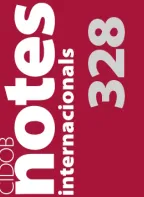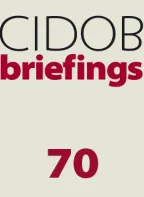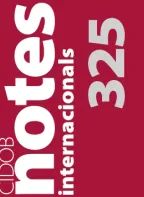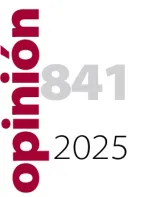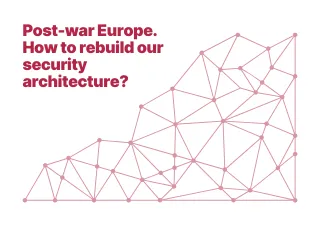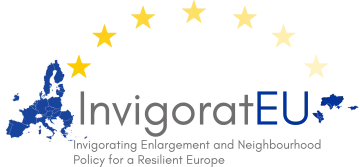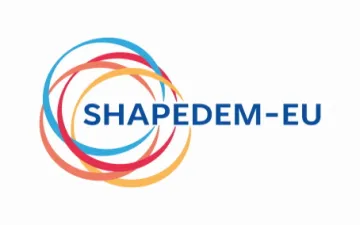Books
Alcaro, Riccardo and Pol Bargués (2025) Conflict Management and the Future of EU Foreign and Security Policy: Relational Power Europe. London and New York: Routledge.
Waldow, Valerie, Pol Bargués & David Chandler (Eds) (2024) Hope in the Anthropocene: Agency, Governance and Negation. Edinburgh University Press
Bargués-Pedreny, Pol, David Chandler and Elena Simon (2018) Mapping and Politics in the Digital Age. London: Routledge
Bargués-Pedreny, Pol (2018) Deferring Peace in International Statebuilding: Difference, Resilience and Critique London: Routledge
Articles
Bargués, Pol. (2025). Pragmatism, courage, and ideals of peace in times of war. Peacebuilding, 1–16. https://doi.org/10.1080/21647259.2024.2411829
Bargués, Pol, Assem Dandashly, Hylke Dijkstra & Gergana Noutcheva (2024) Engagement against All Odds? Navigating Member States’ Contestation of EU Policy on Kosovo, The International Spectator 59 (1), 19-38.
Pol Bargués, Jonathan Joseph, Ana E Juncos (2023) Rescuing the liberal international order: crisis, resilience and EU security policy. International Affairs 99 (6), 2281–2299.
Pol Bargués, David Chandler, Sebastian Schindler and Valerie Waldow (2023) Hope after ‘the end of the world’: rethinking critique in the Anthropocene. Contemporary Political Theory
Pol Bargués (2023) Liberal Peacebuilding and its Critiques. Oxford Research Encyclopedia of International Studies
Pol Bargués, María Martín de Almagro & Katrin Travouillon (2023) New Visions, Critiques, and Hope in the Post-Liberal Age? A Call for Rethinking Intervention and Statebuilding, Journal of Intervention and Statebuilding, 17(1), 1-15.
Maria Martin de Almagro & Pol Bargués (2022) A feminist opening of resilience: Elizabeth Grosz, Liberian Peace Huts and IR critiques. Journal of International Relations and Development. 25, pages 967–992.
Pol Bargués & Schmidt, Jessica (2021) Resilience and the Rise of Speculative Humanitarianism: Thinking Difference through the Syrian Refugee Crisis. Millennium: Journal of International Studies 49 (2), pp. 197-223.
Bargués, Pol & Morillas, Pol (2021) From democratization to fostering resilience: EU intervention and the challenges of building institutions, social trust, and legitimacy in Bosnia and Herzegovina. Democratization, 28:7, 1319-1337.
Bargués, Pol (2020) ‘Peacebuilding without peace? On how pragmatism complicates the practice of international intervention’ Review of International Studies 46 (2), 237-255.
Bargués-Pedreny, Pol (2020) ‘Resilience is “always more” than our practices: Limits, critiques, and skepticism about international intervention’ Contemporary Security Policy 41 (2), 263-286.
Bargués-Pedreny, Pol and Maria Martin de Almagro (2020) ‘Prevention From Afar: Gendering Resilience and Sustaining Hope in Post-UNMIL Liberia’ Journal of Intervention and Statebuilding 14 (3), 327-348.
Bargués, Pol (2020) 75 años de Naciones Unidas: La ONU y la Idea de Sostener la Paz en un Mundo Multipolar 72 (2): 341-349.
Bargués-Pedreny, Pol (2019) ‘From Critique to Affirmation in International Relations’ Global Society 32 (1), 1-19.
Bargués-Pedreny, Pol and Jessica Schmidt (2019) ‘Learning to Be Postmodern in an All Too Modern World: “Whatever Action” in International Climate Change Imaginaries’ Global Society 32 (1), 45-65.
Bargués-Pedreny, Pol and Xavier Mathieu (2018) ‘Beyond Silence, Obstacle and Enigma: Revisiting the Problem of Difference in Peacebuilding’, Journal of Intervention and Statebuilding 12 (3), 283-299. See also edited book from special issue: The Politics of Peacebuilding in a Diverse World: Difference Exposed (London: Routledge).
Bargués-Pedreny, Pol and Elisa Randazzo (2018) 'Hybrid peace revisited: an opportunity for considering self-governance?' Third World Quarterly 39 (8), 1543-1560.
Pol Bargués-Pedreny (2017) 'Connolly and the never-ending critiques of liberal peace: from the privilege of difference to vorarephilia'Cambridge Review of International Affairs, 30 (2-3), 216-234.
Pol Bargués-Pedreny (2016) ‘From Promoting to De-Emphasising “Ethnicity”: Rethinking the Endless Supervision of Kosovo’, Journal of Intervention and Statebuilding, 10 (3), 222-240.
Pol Bargués-Pedreny (2015) ‘Realising the “Postmodern” Dream: Strengthening the Resilience of Post-Conflict Societies and the Promise of Peace,’ Resilience: International Policies, Practices and Discourses, 3 (2), 113–132.
Book Chapters
Bargués, Pol (2025) 'Pragmatismo', en Ángela Iranzo Dosdad, Itziar Ruiz-Giménez Arrieta, Marta Iñiguez de Heredia (Eds) Manual de estudios críticos: cartografías disidentes para comprender las relaciones internacionales (pp. 371-390). Tirant lo Blanch.
Bargués, Pol y Maria Martin de Almagro Iniesta (2024) La prevención de la violencia contra las mujeres en Liberia: Los límites de la «Spotlight Initiative», en Esther Barbé y Magdalena María Martin Martínez (Eds) La violencia contra las mujeres en un orden internacional en transición Aranzadi.
Bargués-Pedreny, Pol (2022). Més guerra per continuar la guerra. En: FundiPau (edició i coordinació). Aprenentatges pendents arran de la guerra Ucraïna.
Bargués, Pol (2021) 'Conclusion: European vulnerability and the policy dilemmas of resilience in times of coronavirus' in Elena Korosteleva and Trine Flockhart Resilience in EU and International Institutions Redefining Local Ownership in a New Global Governance Agenda. London and New York: Routledge.
Bargués-Pedreny, Pol and Xavier Mathieu (2019) ‘Intervening in a Diverse World: Revisiting the ‘problem’ of difference in international statebuilding’. In: Nicolas Lemay-Hébert Handbook on Intervention and Statebuilding. Cheltenham and Northampton: Edward Elgar Publishing.
Bargués-Pedreny, Pol, David Chandler and Elena Simon (2018) ‘Introduction’. In Pol Bargués-Pedreny, David Chandler and Elena Simon Mapping and Politics in the Digital Age. London: Routledge
Bargués-Pedreny, Pol (2018)‘Mapping without the world and the poverty of digital humanitarians’. In Pol Bargués-Pedreny, David Chandler and Elena Simon Mapping and Politics in an Age of Critique. London: Routledge, 2018.
Bargués-Pedreny, Pol ‘False Promise: Local Ownership and the Denial of Self-Government’. In Tobias Debiel, Thomas Held and Ulrich Schneckener (Eds.) Peacebuilding in Crisis? Rethinking Paradigms and Practices of Transnational Cooperation, pp. 227-239 (London: Routledge Global Cooperation Series, 2016).
Other contributions, blog engagement
Bargués, Pol & Schmidt, Jessica (2021). The Tragic Practice of Prevention. Centre for Global Cooperation Research. Quarterly Magazine (April)
Bargués, Pol (2020) Containing Coronavirus: Resilience in Times of Catastrophe. E-International Relations, March 23.
Bargués-Pedreny, Pol, Kai Koddenbrock, Jessica Schmidt and Mario Schmidt (2015) Ends of Critique. Global Dialogue. Duisburg: Käte Hamburger Research/ Centre for Global Cooperation Research 2015.
Bargués-Pedreny, Pol, Kai Koddenbrock, Jessica Schmidt and Mario Schmidt (2015) ‘Introduction’. In: Pol Bargués-Pedreny, Kai Koddenbrock, Jessica Schmidt and Mario Schmidt (eds.), Ends of Critique. Global Dialogue 10, pp. 6-10. Duisburg: Käte Hamburger Research/ Centre for Global Cooperation Research 2015
Bargués-Pedreny, Pol (2015)‘The Betrayal of the New Utopianism.’ In Pol Bargues-Pedreny, Kai Koddenbrock, Jessica Schmidt and Mario Schmidt (Eds.) Ends of Critique. Global Dialogue 10, pp. 62-73 (Duisburg: Käte Hamburger Research/ Centre for Global Cooperation Research, 2015).

